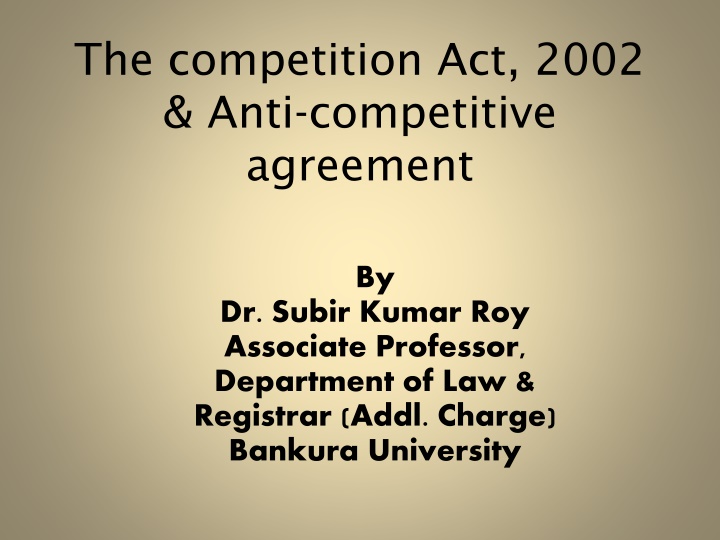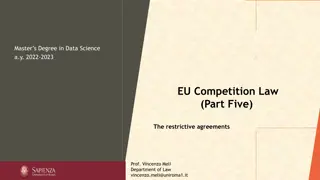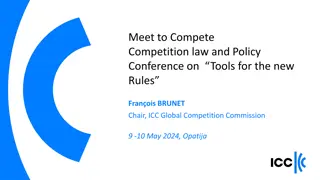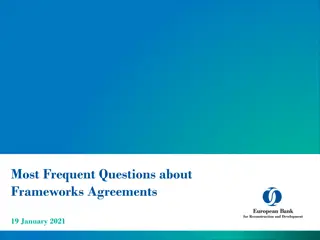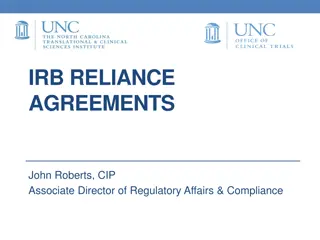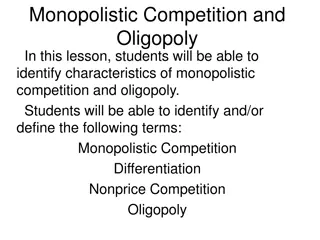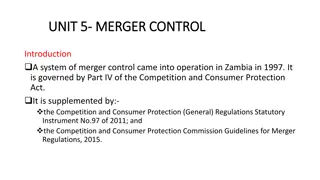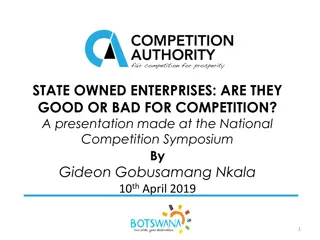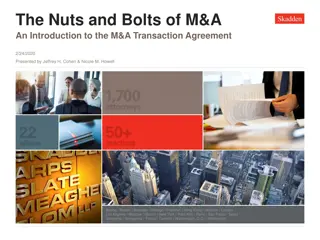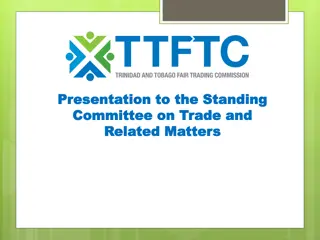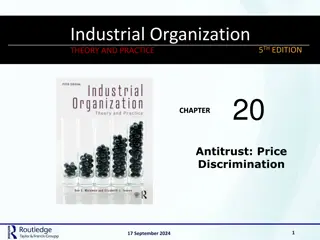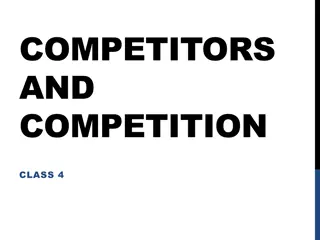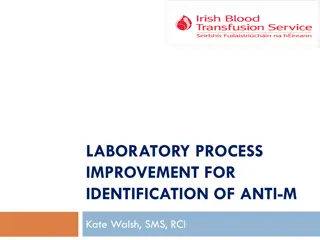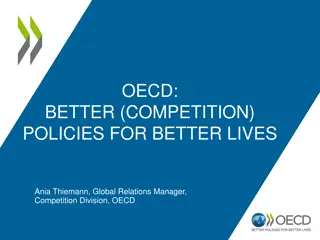The Competition Act, 2002 & Anti-Competitive Agreements: Overview
The Competition Act, 2002 primarily focuses on prohibiting anti-competitive agreements, preventing abuse of dominant positions, regulating combinations, and establishing the Competition Commission of India. Section 3 of the Act specifically prohibits agreements that have an adverse impact on competition in India. It outlines the types of agreements that are considered anti-competitive and void under the law, aiming to promote fair market practices and enhance competition.
Download Presentation

Please find below an Image/Link to download the presentation.
The content on the website is provided AS IS for your information and personal use only. It may not be sold, licensed, or shared on other websites without obtaining consent from the author.If you encounter any issues during the download, it is possible that the publisher has removed the file from their server.
You are allowed to download the files provided on this website for personal or commercial use, subject to the condition that they are used lawfully. All files are the property of their respective owners.
The content on the website is provided AS IS for your information and personal use only. It may not be sold, licensed, or shared on other websites without obtaining consent from the author.
E N D
Presentation Transcript
The competition Act, 2002 & Anti-competitive agreement By Dr. Subir Kumar Roy Associate Professor, Department of Law & Registrar (Addl. Charge) Bankura University
The competition Act mainly focuses upon: Prohibition of anti competitive agreements Prevention of Abuse of Dominant position Regulation of combinations Establishment of Competition Commission of India- which is the regulatory and adjudicatory body, having quasi judicial, quasi legislative and executive functions with respect to the competition in market. competition advocacy to enhance the awareness of the people and market players on competition and its usefulness and also to suggest the Central as well as the State Governments to suggest the best possible ways for incorporation of market economy in pace with the LPG system and to strengthen the national economy
Section 3 of the Competition Act prohibits those agreement which causes or is likely to cause an appreciable adverse impact on competition in India is deemed to be anticompetitive and will be considered as void
Section 3 (1) No enterprise or association of enterprises or person or association of persons shall enter into any agreement in respect of production, supply, distribution, storage, acquisition or control of goods or provision of services, which causes or is likely to cause an appreciable adverse effect on competition within India. (2) Any agreement entered into in contravention of the provisions contained in subsection (1) shall be void (3) of the Competition Act provides that Any agreement entered into between enterprises or associations of enterprises or persons or associations of persons or between any person and enterprise or practice carried on, or decision taken by, any association of enterprises or association of persons, including cartels, engaged in identical or similar trade of goods or provision of services, which (a) directly or indirectly determines purchase or sale prices; (b) limits or controls production, supply, markets, technical development, investment or provision of services; (c) shares the market or source of production or provision of services by way of allocation of geographical area of market, or type of goods or services, or number of customers in the market or any other similar way; (d) directly or indirectly results in bid rigging or collusive bidding, shall be presumed to have an appreciable adverse effect on competition
Sec.3(4) Any agreement amongst enterprises or persons at different stages or levels of the production chain in different markets, in respect of production, supply, distribution, storage, sale or price of, or trade in goods or provision of services, including (a) tie-in arrangement; (b) exclusive supply agreement; (c) exclusive distribution agreement; (d) refusal to deal; (e) resale price maintenance, shall be an agreement in contravention of sub-section (1) if such agreement causes or is likely to cause an appreciable adverse effect on competition in India.
"bid rigging" means any agreement, between enterprises or persons referred to in sub-section (3) engaged in identical or similar production or trading of goods or provision of services, which has the effect of eliminating or reducing competition for bids or adversely affecting or manipulating the process for bidding.
Cartel finds its mention under section 3(3) of the Competition Act, 2002 as per the definition provided under sec.2(c) cartel includes an association of producers, sellers, distributers, traders or service providers who by agreement among themselves, limit, control or attempt to control the production, distribution, sale or price of or trade in goods or production of services.
As per section 2(b) agreement includes any arrangement or understanding or action in concert: (i) whether or not, such arrangement, understanding or action is formal or in writing; or (ii) whether or not such arrangement, understanding or action is intended to be enforceable by legal proceedings;
The competition Act does not specifically use the terminology, but section 3(3) and 3(4) indirectly classifies agreements into two forms, for the purpose of ascertaining the anti competitive nature, viz: i) Horizontal Agreements ii) Vertical Agreements
Horizontal agreements are agreements between enterprises, group of enterprises, persons or group of persons, engaged in trade of identical or similar products. Horizontal agreements are entered between two or more competitors at same level of activity, for example- producers, distributers, manufacturers. Usually the essence and purpose of horizontal agreements is to generate policies regarding production, distribution and price fixation. Also such agreements provide a channel for sharing of information which can usually be price sensitive and may influence the market. Such practices adversely affect competition by prompting antitrust law violations. Horizontal agreements also affect prices and quality of products in the market.
The types of horizontal agreements which are considered to be anti competitive under section 3(3) are: a) Agreements that directly or indirectly determine purchase or sale prices: b) Limits or controls production, supply, markets, technical development, c) Shares the market or source of production or provision of services by way of allocation of geographical area of market, or type of goods or services, or the number of customers in the market or any other similar way d) Directly or indirectly results in bid-rigging or collusive bidding
So far Sec.3 (4) of the Competition Act, 2002 is concerned it raises the issues related to vertical agreement which has the appreciable adverse impact on Vertical agreement is formed amongst the market players at different stages or levels of the production chain in different market. Vertical agreement always take place among the persons who are not belonging from any rival group or in other words we can say they are not the competitors rather engaged with different levels of market chain. For example, franchising is a kind of vertical agreement where an avocation grants lease to the franchisee to use the brand s business model and name. market mechanism.
Vertical agreements are detrimental to the competitive culture if affect the production ,supply distribution, price etc. of goods and services and includes: Tie in Arrangement Tying exists when the supplier makes the sale of goods or provides services conditional upon the purchase of another distinct product from the supplier or service provider or someone designated by the latter. Exclusive Supply agreement Exclusive supply means that there is only one buyer inside the Community to which the supplier may sell a particular final product or the purchaser is restricted from purchasing the goods other than a particular seller or any other designated person (P.T.O.)
Exclusive Distribution Agreement Exclusive distribution agreement includes any agreement to limit , restrict or impose any other conditions including allocation of market or markets for the disposal or sale of goods. Refusal to deal The agreement which directs to whom the goods will be sold or from whom the goods will be purchased. Resale price maintenance Seller will fix or direct the price on which the purchaser will be bound to resale the goods
Apart from this, Section 19(3) of the Competition Act 2002expressly mentions the factors which the Competition Commission shall consider while adjudging whether an agreement or an arrangement has caused or is likely to cause appreciable adverse impact on competition. The factors which CCI may observe in order to determine whether any agreement are anti competitive or not are whether such agreement causes or indulges in: (a) creation of barriers to new entrants in the market; (b) driving existing competitors out of the market; (c) foreclosure of competition by hindering entry into the market; (d) accrual of benefits to consumers; (e) improvements in production or distribution of goods or provision of services; or (f) promotion of technical, scientific and economic development by means of production or distribution of goods or provision of services.
